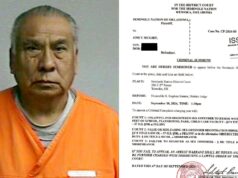
On Monday, the Oklahoma Highway Safety Office announced Oklahoma Highway Patrol troopers would participate in a regional campaign to fight drug-impaired driving. As part of the END420DUI “enhanced enforcement campaign,” increased patrols and sobriety checkpoints will be in place across Oklahoma, Kansas, Iowa, Nebraska, Arkansas and Missouri.
“This is a regional enforcement campaign focused on 4-20,” OHSO communications manager Cody McDonnell said during an interview Tuesday. “The theory is that people who choose to partake will consume marijuana at 4:20 p.m. on April 20 (…) or 4:20 a.m. if they are awake.”
For the uninitiated, the History Channel has an in-depth origin story on how the combination of the numbers four and 20 created a marijuana-referencing term in the 1970s.
Paul Harris, director of the Oklahoma Highway Safety Office, stated in his organization’s release:
Oklahoma is participating in this regional campaign to help curb the rise of drug-impaired drivers and crashes. … Through this enhanced enforcement campaign, we are hoping to keep drug-impaired drivers off the roads and save some lives.
When and where?
According to the release, the increased presence will begin at midnight on Friday and end at 6 p.m. Saturday. During that time, drivers in Oklahoma should note the potential for END420DUI checkpoints and other enhanced enforcement (e.g. drug-detecting dogs) in conjunction with local law enforcement in the following communities:
- Oklahoma City
- Tulsa
- Alva
- Lawton
- Anadarko (non-OHP supported)
Tulsa’s END420DUI efforts will coincide with JaneFest, an indoor-outdoor live music and arts festival taking place in that city’s downtown area.
McDonnell said “there might be” another END420DUI checkpoint in the northwest portion of the state.
“If they’re going to go out and partake in the occasion, just as we tell them for drinking, plan ahead and have a sober driver,” said McDonnell.
McDonnell said rain could hamper the END420DUI checkpoints, which could be suspended in bad weather for safety purposes.
(Editor’s note: William W. Savage III contributed to this report.)




















